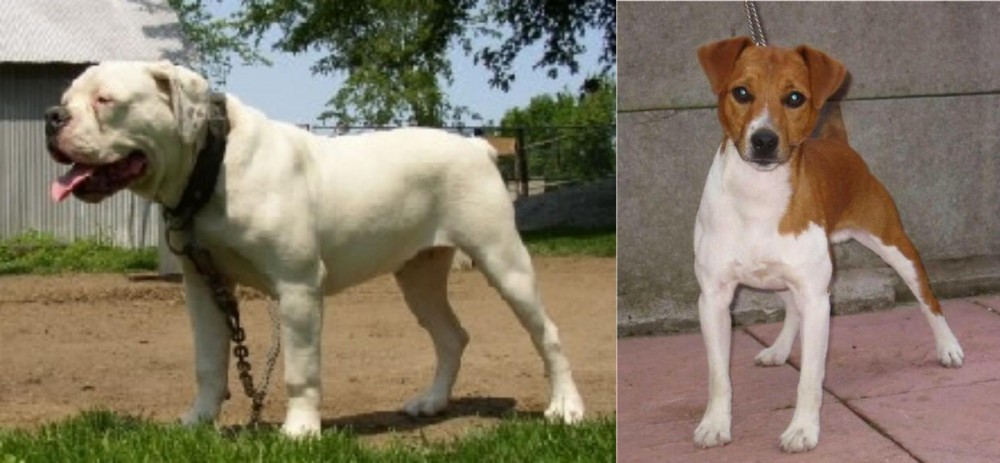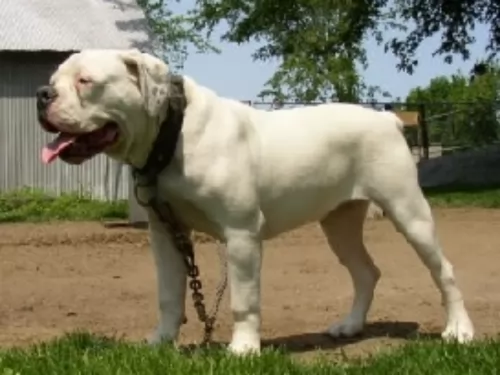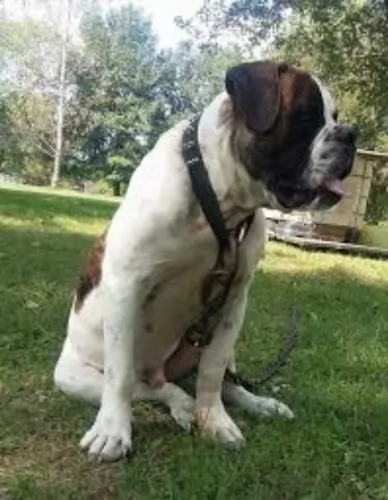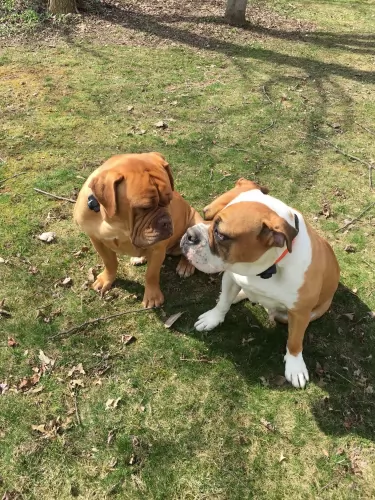 Petzlover
Petzlover Hermes Bulldogge is originated from United States but Plummer Terrier is originated from United Kingdom. Hermes Bulldogge may grow 27 cm / 11 inches higher than Plummer Terrier. Hermes Bulldogge may weigh 60 kg / 133 pounds more than Plummer Terrier. Both Hermes Bulldogge and Plummer Terrier has same life span. Hermes Bulldogge may have more litter size than Plummer Terrier. Both Hermes Bulldogge and Plummer Terrier requires Low Maintenance.
Hermes Bulldogge is originated from United States but Plummer Terrier is originated from United Kingdom. Hermes Bulldogge may grow 27 cm / 11 inches higher than Plummer Terrier. Hermes Bulldogge may weigh 60 kg / 133 pounds more than Plummer Terrier. Both Hermes Bulldogge and Plummer Terrier has same life span. Hermes Bulldogge may have more litter size than Plummer Terrier. Both Hermes Bulldogge and Plummer Terrier requires Low Maintenance.
 The Hermes Bulldogge is not a breed in itself, but is actually a line within the English Bulldogge line. The Hermes family in the United States bred this line for several years. The Hermes Bulldogge line is the largest of the re-creations from the English Bulldogge. They are inspired by the arena dogs from the days of the Roman Empire. Greg and Linda Hermes have bred healthy, smart, resilient and agile dogs. The desire of the Hermes was an attempt at recreating the 17th century dog.
The Hermes Bulldogge is not a breed in itself, but is actually a line within the English Bulldogge line. The Hermes family in the United States bred this line for several years. The Hermes Bulldogge line is the largest of the re-creations from the English Bulldogge. They are inspired by the arena dogs from the days of the Roman Empire. Greg and Linda Hermes have bred healthy, smart, resilient and agile dogs. The desire of the Hermes was an attempt at recreating the 17th century dog.
They used a variety of breeds to create the Hermes Bulldogge, most of whom are never disclosed. Some of the dogs that were probably used include: English Mastiffs, American Bulldogs, Old English Bulldogges, and pit Bull Terriers. This family of dogs are playful, friendly, and good family dogs. They have a strong prey drive which makes them good hunters but not as good around other small animals or small children. The Hermes have been breeding the Hermes Bulldogge since since 1983. The puppies are all hand raised, child friendly with great health.
When discussing the Hermes Bulldogge, one must go back to the root of the English Bulldogge. That breed comes originally from England and various lines have been recreated by various breeders. The breeding of the Old English Bulldogge with Mastiffs and Pits lead to other lines that the breeders called Old English. But most fanciers believe that only two lines of the original Old English Bulldogge remain and that is the Leavitt and the Hermes.
Some form of bulldog has been in existence since 700 years ago and as it was mixed with a variety of other breeds it took on other forms over time. The English Bulldogge was a definite couch potato. Instead of being bred for a job or look, the Bulldogge was developed with temperament, ability and health in mind. This has made for a great family dog without a lot of veterinarian bills.
 This purebred dog was developed by Dr David Brian Plummer in the UK. The whole idea for developing the dog was for it to be an all-purpose dog that could also hunt down vermin.
This purebred dog was developed by Dr David Brian Plummer in the UK. The whole idea for developing the dog was for it to be an all-purpose dog that could also hunt down vermin.
Developed in the 1960s, the Plummer Terrier combines Jack Russell Terrier, Beagle, and red Fell Terrier blood. Later on, a Bull Terrier was brought in too. This created some problems and certain characteristics were selectively bred out of the Plummer.
Today, as a working terrier, the dog is versatile and has many uses. He may not be recognized by any major organizations, but there is at least a well-established Plummer Terrier club in the UK.
 The Hermes Bulldogge, much like the original Olde English Bulldogge, is taller, healthier, more athletic than the original English Bulldog. They are medium height, with a large head, a strong body and a deep, wide chest and broad shoulders. Tails might or might not be docked but the ears are never docked. They n have a moderate amount of wrinkles and a longer, less smashed face than the original. It is easier for the Hermes Bulldogge to breath, to fly and to live in warmer environments that it is for the English Bulldogge. His eyes are lower in his head but in the front center.
The Hermes Bulldogge, much like the original Olde English Bulldogge, is taller, healthier, more athletic than the original English Bulldog. They are medium height, with a large head, a strong body and a deep, wide chest and broad shoulders. Tails might or might not be docked but the ears are never docked. They n have a moderate amount of wrinkles and a longer, less smashed face than the original. It is easier for the Hermes Bulldogge to breath, to fly and to live in warmer environments that it is for the English Bulldogge. His eyes are lower in his head but in the front center.
They are very dark almost black. Eyelids should cover the white of the eye and they have rounded cheeks. They have a short muzzle and short face. Broad, thick lips finish out the face with very large, square, broad jaws.
 The Plummer Terrier is a small, working terrier standing at between 28 and 36cm both male and female and weighing between 5 and 8kg.
The Plummer Terrier is a small, working terrier standing at between 28 and 36cm both male and female and weighing between 5 and 8kg.
The ears of the dog are high set and are fairly short, being floppy. The Plummer Terrier has a white and red/orangey coat which is short. He is an average shedder.
The tail would traditionally be docked, giving him an attractive, compact look, but these days the tail tends to be left long. The eyes are almond-shaped, dark brown and alert.
Your Plummer Terrier is active, hardy and adaptable, making it that he can settle down into life in the city or in the countryside. They will however, require regular exercise.
They’re the kind of dogs which are at home inside or outside. They’re very intelligent and can easily be trained and socialized. They’re also loving and loyal towards their human family. He is good with kids too and is playful and energetic around them, giving as good as he gets. His alert, intelligent nature makes him a good watchdog.
 If socialized properly this line of bulldog is harmful to me.
If socialized properly this line of bulldog is harmful to me.
Strong and athletic, his strength and stamina.
He is not very adaptable. Apartments are not good for this dog. He needs to run and if possible to hunt.
He is very intelligent but stubborn which affects his learning ability.
 Your Plummer Terrier promises to be a great companion and family pet, getting on well with children.
Your Plummer Terrier promises to be a great companion and family pet, getting on well with children.
They’re intelligent too, so they’re easy to train. Being low maintenance and being a healthy breed too, the Plummer Terrier has got everything that people want from a canine friend - love, devotion, action, low maintenance, health and a wonderfully companionable nature.
 The Hermes Bulldogge is healthier than most bulldogs. His face is not as smashed and he is not as wrinkled. He can breathe easier than other Bulldogs. The two major concerns are hip dysplasia and bloat.
The Hermes Bulldogge is healthier than most bulldogs. His face is not as smashed and he is not as wrinkled. He can breathe easier than other Bulldogs. The two major concerns are hip dysplasia and bloat.
Hip Dysplasia also some elbow dysplasia: can cause lameness and arthritis
Terminal unless treated immediately. Can be prevented by not feeding large meals before or after heavy exercise.
 These feisty little dogs are known to be a robust, healthy breed and with good care can reach between 12 and 15 years of age, and maybe older.
These feisty little dogs are known to be a robust, healthy breed and with good care can reach between 12 and 15 years of age, and maybe older.
Some common dog diseases that your Plummer Terrier might succumb too, but which is highly unlikely.
Distemper and parvovirus are two example of these infectious diseases. Parvovirus is deadly and can be picked up through contact with the feces of an infected dog. Your dog will be vomiting, won’t want to eat and will no doubt also have bloody diarrhea.
Distemper is transmitted through contact with an infected dog’s urine or blood. Symptoms include difficulty with breathing, fever and diarrhea. There are vaccines available for the prevention of these life-threatening diseases.
This disease can be debilitating for your pet and can include incontinence and bacterial infections. You’ll find your pet trying to urinate frequently but producing small drops of urine. Don’t hesitate – get your pet to the vet immediately.
You have to be careful with dental disease because many people think it affects just the teeth but it is linked to problems with the heart, kidneys and to diabetes. To prevent dental problems, look inside your dog’s mouth regularly and get him to a vet or professional dog groomer to attend to the tooth.
 When feeding a Hermes Bulldogge puppy be sure you feed puppy meal for bulldogs or medium dogs. For first year fee 2-4 times a day 2 cups food.
When feeding a Hermes Bulldogge puppy be sure you feed puppy meal for bulldogs or medium dogs. For first year fee 2-4 times a day 2 cups food.
Feed the adult a solid adult dry food. 2 cups twice a day.
Better health than most lines of Bulldogs. Few wrinkles and less problems breathing as he doesn’t have a smashed face.
He doesn’t need a lot of exercise but daily walks and lots of play time. He can enjoy Lure Coursing obedience, agility and obedience
 He is an active, energetic little dog and loves nothing more than to be darting after a ball, going for long walks with you or jumping into a pool. He’s happiest when active and busy with his beloved family members.
He is an active, energetic little dog and loves nothing more than to be darting after a ball, going for long walks with you or jumping into a pool. He’s happiest when active and busy with his beloved family members.
With his short coat and being a moderate shedder, you’ll just have to give your Plummer a good brush twice a week to keep the coat free of loose hairs and dust.
Always aim to give your dogs the best food there is. Dogs are just like people when it comes to food – nutritious, quality food helps towards good health and longevity. Apart from a good quality commercially manufactured food, give him some homemade food as a treat too. Simple, tasty food is best appreciated by dogs. They don’t want spicy, exotic foods that can upset their stomachs.
They love boiled chicken, brown rice or pasta and healthy vegetables such as sweet potatoes, carrots and spinach. You can add this into the dry kibble occasionally as a treat, and also some raw meat from time to time. Your pet will be healthy and happy with such a diet. Make sure he always has a bowl of cool, fresh water within reach.